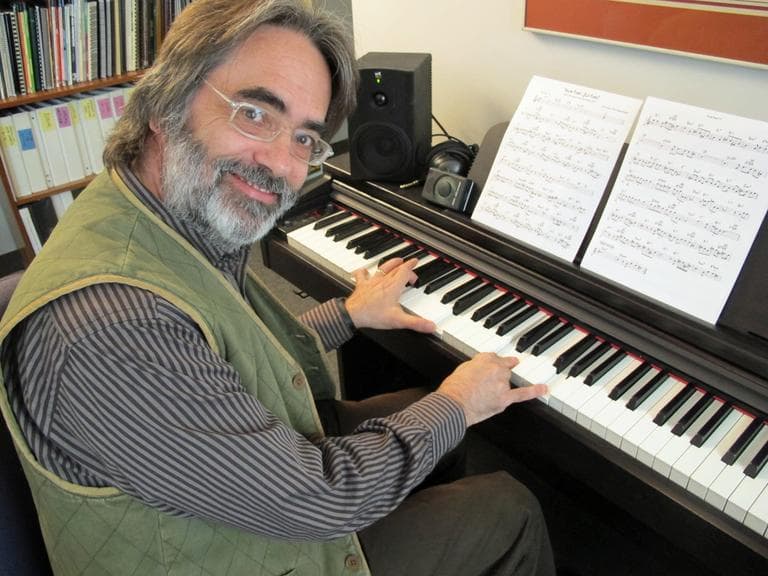Advertisement
Campaign Ad Music: It's All About Emotional Response
ResumeWith Election Day looming, political war rooms are cranking out television ads hoping to sway undecided voters. News outlets — like ours — have been picking apart the torrent of images and messages this season, but what about the music?
'The Terminator Campaign'

Try this: Close your eyes at the start of a presidential campaign ad and listen to the tiny music score in the background. Matthew Nicholl, chair of Berklee College of Music's contemporary writing and production department, says from the first note you can tell what type of commercial it is. Nicholl, who has composed scores for multiple political campaigns, even came up with Hollywood-inspired nicknames, including “The Terminator Campaign.”
“There’s doom!” Nicholl exclaimed as he illustrated the chords and flourishes typical of the Terminator-style motif employed by many campaigns. Then he plays music from the soundtrack for the 1984 sci-fi classic starring actor-turned-politician Arnold Schwarzenegger as a relentless cyborg assassin.
The score pulses with militaristic percussion mixed with some eerie sound effects. It's ominous and undeniably threatening.
“And you can tell no matter who shows up on screen ... we need an immediate cue that this is the bad guy, this is the Terminator," Nicholl said. "We see him on the screen, the music says, 'Wait, this is not warm and fuzzy, this is stuff to worry about.' "
Evoking Emotional Responses
And it's nothing new, according the Boston University communications professor Tobe Berkovitz.
“The trend that we’ve seen in advertising for literally the last 30 years has been attack advertising,” Berkovitz explained. “So what you’re doing with your music is basically trying to scare the hell out of people.”
Berkovitz knows this firsthand. He worked for 30 years as a political media consultant and says, just like music in a horror movie, political ad scores aim to evoke visceral, emotional responses. And they often do, even if the compositions are in the background and aren’t the caliber of something by Hans Zimmer or John Williams.
“The trend that we’ve seen in advertising for literally the last 30 years has been attack advertising. So what you’re doing with your music is basically trying to scare the hell out of people.”
Tobe Berkovitz, BU professor
“Most political advertising is wallpaper for the average viewer. They don’t pay much attention to the ad, you pay even less attention to the music," Berkovitz said. "But it’s very important because it’s really working on your subconscious and your unconscious, you’re not aware of it and yet it’s having an impact on how you’re perceiving the ad, and really importantly how you’re perceiving the candidate.”
Berklee’s Nicholl supplies an example: the campaign ad music he composed for presidential candidates Ronald Reagan, George H.W. Bush and Bob Dole. He recalls how Dole’s people were determined to fix his stiff public image and said, “You gotta warm this guy up! Do what you can.”
So Nicholl played them some really sweet sounding stuff.
“You know, very much what we would call 'heartland music' ... Which all came from a particular film that was influential in the 1980s, 'The Natural,' done by Randy Newman," Nicholl said. "It changed the face of advertising music. Everybody who came in who wanted a particular spot would reference that movie.”
Then Nicholl pressed play on a recording of “The Natural” soundtrack and there they were. Those cozy, even sappy chord progressions I feel like I’ve heard a million times before.
“These are where the candidate is saying, 'OK, now there's work to be done. Trust me to do this work. I can handle this, I can do this job.' "
The music is warm but motivating: neutral sounding without any major or minor chords.
“It’s positive,” Nicholl described. “It’s got activity.”
The fourth and final music type aims to tap into voter insecurities. He calls it “The Worried Spot.” In other words, we should be worried about what's going on — this is not good what's happening.
Nicholl admits to being a bit cynical after years of writing manipulative music for both Democrats and Republicans — but believes we viewers are savvy and, well, accustomed to being duped.
“I mean, that's why we like the music. We like it because it manipulates us in a good way and why we like films is because we get manipulated and we get into the story," Nicholl said. "Music is just one of the many elements that combine to carry us away in the arc of the story and the drama of the moment."
And there will be no shortage of drama in the flurry of 11th-hour campaign ads we’ll be watching — and listening to — between now and Election Day.
Oh, there is one more music category Nicholl and I didn't get to talk about: I named it “Carnival Fun House.” I have a feeling you know exactly what I’m referring to.
This program aired on October 26, 2012.



